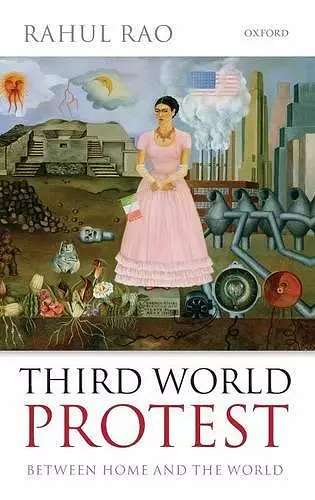Third World Protest
Between Home and the World
Format:Hardback
Publisher:Oxford University Press
Published:8th Jul '10
Currently unavailable, and unfortunately no date known when it will be back

If boundaries protect us from threats, how should we think about the boundaries of states in a world where threats to human rights emanate from both outside the state and the state itself? Arguing that attitudes towards boundaries are premised on assumptions about the locus of threats to vital interests, Rahul Rao digs beneath two major normative orientations towards boundaries-cosmopolitanism and nationalism-which structure thinking on questions of public policy and identity. Insofar as the Third World is concerned, hegemonic versions of both orientations are underpinned by simplistic imageries of threat. In the cosmopolitan gaze, political and economic crises in the Third World are attributed mainly to factors internal to the Third World state with the international playing the role of heroic saviour. In Third World nationalist imagery, the international is portrayed as a realm of neo-imperialist predation from which the domestic has to be secured. Both images capture widely held intuitions about the sources of threats to human rights, but each by itself provides a resolutely partial inventory of these threats. By juxtaposing critical accounts of both discourses, Rao argues that protest sensibilities in the current conjuncture must be critical of hegemonic variants of both cosmopolitanism and nationalism. The second half of the book illustrates what such a critique might look like. Journeying through the writings of James Joyce, Rabindranath Tagore, Edward Said and Frantz Fanon, the activism of 'anti-globalisation' protesters, and the dilemmas of queer rights activists, Rao demonstrates that important currents of Third World protest have long battled against both the international and the domestic, in a manner that combines nationalist and cosmopolitan sensibilities.
This is a perspicacious and wonderfully engaging book. * Musab Younis, Millenium- Journal of International Studies *
Rao displays impressive empirical range and theoretical nuance ... This timely, nuanced and beautifully written book ... should be widely read by historians and theorists of nations and nationalism and all those concerned with the problems of identity, solidarity and political action in the contemporary world. * Michael Collins, University College London *
This is a fascinating and nuanced book, and one that prompted a range of responses to its core arguments as I read it. It addresses issues that are at the heart of contemporary debates about social movements and popular mobilization in our contemporary globalized environment. It deserves to be read and debated by both researchers and students alike. * John Solomos, Ethnic and Racial Studies *
In this slim and readable volume, Rao presents us with a way of thinking about international normative theory that deserves to have a major and fundamental impact far beyond the sum of the books individual parts. It is his methodological focus on Third World populations and movements as a source for thinking pragmatically about ethics that is so new, and so long-awaited ... Third World Protest is highly recommended indeed, compulsory reading. * Musab Younis, Ceasefire *
ISBN: 9780199560370
Dimensions: 241mm x 163mm x 22mm
Weight: 593g
288 pages